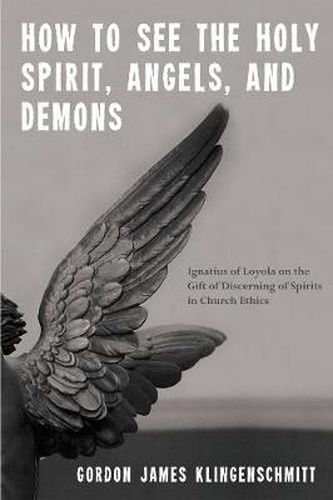Readings Newsletter
Become a Readings Member to make your shopping experience even easier.
Sign in or sign up for free!
You’re not far away from qualifying for FREE standard shipping within Australia
You’ve qualified for FREE standard shipping within Australia
The cart is loading…






This title is printed to order. This book may have been self-published. If so, we cannot guarantee the quality of the content. In the main most books will have gone through the editing process however some may not. We therefore suggest that you be aware of this before ordering this book. If in doubt check either the author or publisher’s details as we are unable to accept any returns unless they are faulty. Please contact us if you have any questions.
Are God, angels, and demons really invisible? Or can the spirits be seen with human eyes, through the lens of Church Ethics? The gift of discerning of spirits is indispensible to the study of church ethics. Ignatius of Loyola, founder of the Society of Jesus (Jesuits), wrote two sets of Rules for Discerning of Spirits in his Spiritual Exercises in the early 1500s. He taught how the church can receive from God the gift to see otherwise invisible angels, demons, and the Holy Spirit. Ignatius’ views were influenced by John Cassian, Jacobus de Voragine, Ludolph of Saxony, and Thomas a Kempis. Ignatius’ Rules are exegeted in dialogue with contemporary scholars Karl Rahner, Hugo Rahner, Piet Penning de Vries, Jules Toner, and Timothy Gallagher, and applied to one study of ecclesial ethics in the narrative theology of Samuel Wells. A four-step Ignatian pneumato-ethical method is developed, which any analyst can follow to see the spirits, by consolation/desolation, consent, manifestation, and pneumato-ethics. This method revolutionizes how we study ecclesiology, soteriology, missiology/world religions, liturgy, worship, Eucharist, hermeneutics, homiletics, pastoral counseling, church history, and politics. The spirits are not invisible at all. They can be clearly discerned through the lens of ecclesial ethics.
$9.00 standard shipping within Australia
FREE standard shipping within Australia for orders over $100.00
Express & International shipping calculated at checkout
This title is printed to order. This book may have been self-published. If so, we cannot guarantee the quality of the content. In the main most books will have gone through the editing process however some may not. We therefore suggest that you be aware of this before ordering this book. If in doubt check either the author or publisher’s details as we are unable to accept any returns unless they are faulty. Please contact us if you have any questions.
Are God, angels, and demons really invisible? Or can the spirits be seen with human eyes, through the lens of Church Ethics? The gift of discerning of spirits is indispensible to the study of church ethics. Ignatius of Loyola, founder of the Society of Jesus (Jesuits), wrote two sets of Rules for Discerning of Spirits in his Spiritual Exercises in the early 1500s. He taught how the church can receive from God the gift to see otherwise invisible angels, demons, and the Holy Spirit. Ignatius’ views were influenced by John Cassian, Jacobus de Voragine, Ludolph of Saxony, and Thomas a Kempis. Ignatius’ Rules are exegeted in dialogue with contemporary scholars Karl Rahner, Hugo Rahner, Piet Penning de Vries, Jules Toner, and Timothy Gallagher, and applied to one study of ecclesial ethics in the narrative theology of Samuel Wells. A four-step Ignatian pneumato-ethical method is developed, which any analyst can follow to see the spirits, by consolation/desolation, consent, manifestation, and pneumato-ethics. This method revolutionizes how we study ecclesiology, soteriology, missiology/world religions, liturgy, worship, Eucharist, hermeneutics, homiletics, pastoral counseling, church history, and politics. The spirits are not invisible at all. They can be clearly discerned through the lens of ecclesial ethics.